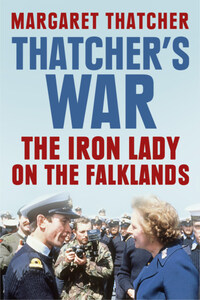Nothing remains more vividly in my mind, looking back on my years in No. 10, than the eleven weeks in the spring of 1982 when Britain fought and won the Falklands War. Much was at stake: what we were fighting for eight thousand miles away in the South Atlantic was not only the territory and the people of the Falklands, important though they were. We were defending our honour as a nation, and principles of fundamental importance to the whole world – above all that aggressors should never succeed and that international law should prevail over the use of force. When I became Prime Minister I never thought that I would have to order British troops into combat and I do not think I have ever lived so tensely or intensely as during the whole of that time.
The first recorded landing on the Falklands was made in 1690 by British sailors, who named the channel between the two principal islands ‘Falkland’s Sound’ in honour of the Treasurer of the Navy, Viscount Falkland. Britain, France and Spain each established settlements on the islands at various times during the eighteenth century. In 1770 a quarrel with Spain caused the British Government of the day to mobilize the fleet and a naval task force was prepared, though never sent: a diplomatic solution was found.
The islands had obvious strategic importance, possessing several good harbours within 500 miles of Cape Horn. In the event that the Panama Canal is ever closed their significance would be considerable. But the Falklands were an improbable cause for a twentieth-century war.
The Argentine invasion of the Falklands took place 149 years after the beginning of formal British rule there, and it seems that the imminence of the 150th anniversary was an important factor in the plotting of the Argentine Junta. Since 1833 there has been a continuous and peaceful British presence on the islands. Britain’s legal claim in the present day rests on that fact, and on the desire of the settled population – entirely of British stock – to remain British. The principle of ‘self-determination’ has become a fundamental component of international law, and is enshrined in the UN Charter. British sovereignty has strong legal foundations, and the Argentinians know it.
Some 800 miles to the south-east of the Falklands lies South Georgia, and 460 miles further out, the South Sandwich Islands. Here the Argentine claim is even more dubious. These islands are dependencies of the United Kingdom, administered from the Falklands. Their climate is severe and they have no settled population. No state claimed them before British annexation in 1908 and there has been continuous British administration since that time.
My first involvement with the Falklands issue came very early in the life of the 1979 Parliament. It was clear that there were only two ways in which the prosperity of the Falkland Islanders could be achieved. The more obvious and attractive approach was by promoting the development of economic links with neighbouring Argentina. Yet this ran up against the Argentine claim that the Falklands and the dependencies were part of their sovereign territory. Ted Heath’s Government had signed an important Communications Agreement in 1971 establishing air and sea links between the islands and the mainland, but further progress had been blocked by the Argentinians unless sovereignty was also discussed. Consequently it was argued that some kind of accommodation with Argentina would have to be reached on the question of sovereignty. Arguments of this kind led Nick Ridley (the responsible minister) and his officials at the Foreign and Commonwealth Office (FCO) to advance the so-called ‘lease-back’ arrangement, under which sovereignty would pass to Argentina but the way of life of the islanders would be preserved by the continuation of British administration. I disliked this proposal, but Nick and I both agreed that it should be explored, subject always to the requirement that the islanders themselves should have the final word. Their wishes must be paramount.
There was, however, another option – far more costly. We could implement the recommendations of the long-term economic survey produced in 1976 by the former Labour minister, Lord Shackleton, and one recommendation in particular – the enlargement of the airport and lengthening of the runway. Such a commitment would have been seen as evidence of the British Government’s determination to have no serious talks about sovereignty and it would have increased our capacity to defend the islands, since a longer runway would have allowed for rapid reinforcement by air. This in turn might have provoked a swift Argentine military response. Unsurprisingly, no government – Labour or Conservative – was prepared to act while there seemed any possibility of an acceptable solution and lease-back had become the favoured option.
However, as I rather expected, the islanders would have nothing to do with such proposals. They distrusted the Argentine dictatorship and more than that, they wanted to remain British. The House of Commons too was noisily determined that the islanders’ wishes should be respected.














